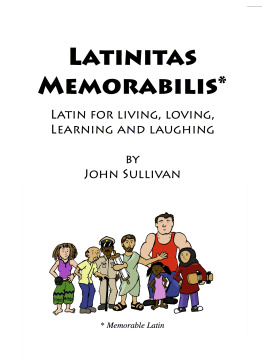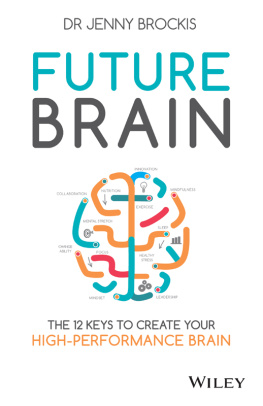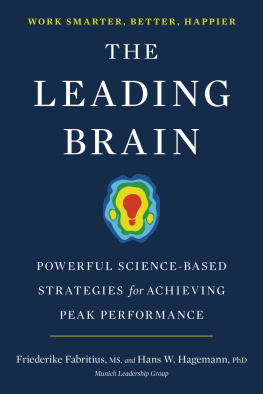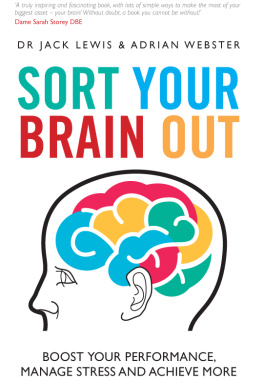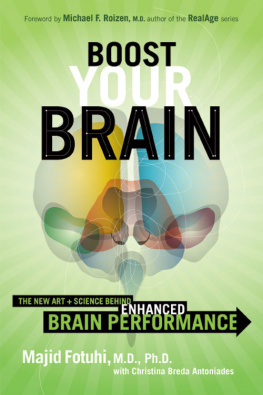THE BRAIN ALWAYS WINS
THE BRAIN
ALWAYS WINS
Improving your life through better
brain management
John Sullivan and Chris Parker

First published in Great Britain in 2016 by Urbane Publications Ltd
Suite 3, Brown Europe House, 33/34 Gleaming Wood Drive, Chatham, Kent ME5 8RZ
Copyright John Sullivan and Chris Parker, 2016
The moral right of John Sullivan and Chris Parker to be identified as the authors of this work has been asserted in accordance with the Copyright, Designs and Patents Act of 1988.
All rights reserved. No part of this publication may be reproduced, stored in a retrieval system, or transmitted in any form or by any means, electronic, mechanical, photocopying, recording or otherwise, without the prior permission of both the copyright owner and the above publisher of this book.
A CIP catalogue record for this book is available from the British Library.
ISBN 978-1-909273-73-3
EPUB 978-1-909273-74-0
KINDLE 978-1-909273-75-7
Design and Typeset by The Invisible Man
Cover by The Invisible Man
Printed in Great Britain by CPI Antony Rowe, Chippenham, Wiltshire

urbanepublications.com
The publisher supports the Forest Stewardship Council (FSC), the leading international forest-certification organisation. This book is made from acid-free paper from an FSC-certified provider. FSC is the only forest-certification scheme supported by the leading environmental organisations, including Greenpeace.
This book is dedicated to my mom, dad, and beautiful new bride.
John Sullivan
For Mairi.
Chris Parker

Contents

Acknowledgements
Accomplishments are not solitary activities and for that reason I would like to acknowledge the following:
Daniel Fabian, Julian Saad, and Caitlin Malone for their efforts, spirit, and youthful enthusiasm for the exploration of the brain and science;
Dr. Antoinette Minniti for her love and support as well as her keen eye for science and narrative combined;
Dr. David Coppel for his collegial support, professionalism, and mutual interest in the brain;
Kim Bissonnette for his professionalism, ethics, and shared vision;
Family and friends who have always supported me; and, to all those in sport and tactical environments who are open to learning about the brain.
John
My thanks to Alan Barnard for his critical and thought-provoking insights, Mairi for her endless support, and Matthew who is everything a Publisher should be bold, creative, caring and collaborative.
Chris

Preface
The first conversation
The best ideas start as conversations.
Sir Jonathan Ive
(i)
My name is Chris Parker. Since the age of nineteen I have been fascinated with Communication and Influence. Its a topic I study, practise, teach and write about. I became involved in meditative practices at exactly the same time as I began my fascination with Communication and Influence. In many ways, the two have gone hand-in-hand ever since. I didnt fully appreciate when I was nineteen that I was making decisions and beginning things that would shape and direct the rest of my life. The year was 1976.
Thirty-seven years later, in October 2013, I met John Sullivan. My life was about to change again.
John is an applied Sport and Clinical Psychologist with many years experience working at the most elite levels of the military, law enforcement and sport. He has trained some of the very best in the world, teaching them how to manage their brain to achieve excellence, proving time and time again it is the brain that ultimately decides what happens in the heat of activity, when those involved have to make and then execute high-pressure decisions. His work, from the most specialized front line military personnel to the NFL, gives him a unique perspective about how and why the brain matters and just how to make the most of it.
We met for lunch in a Chinese restaurant in Nottingham, England. My plan was to find out everything I could about his philosophy, experience and skills. Unfortunately or, fortunately, as things turned out he had the same plan with regard to me. It became a very long lunch in which food was lost behind conversation and conversation quickly gave way to possibilities.
Johns focus, not surprisingly, was on the brain. He said, We have learned much about the interconnection of the brain and its functions through scientific research and through injury to the brain or peripheral systems - typically these discoveries have come from the military and the sacrifices of war.
He paused and reflected momentarily. He was, I knew, firmly committed to providing support for military personnel. It was a topic close to his heart.
After a sip of his tea he went on, Our brain leads, directs, and facilitates all our actions and reactions. Research shows that brain resiliency is influenced by our daily habits including rest and recovery, emotional management, physical activity, socialization and nutritional intake. This is important because the human brain is inherently resilient; its the most sophisticated survival tool. Through our consistent, habitual behaviors we either reinforce or challenge that resiliency.
I didnt realize at the time just where those sentences would eventually take us. It was only in hindsight I saw their significance and potential. When I first heard them I was too busy wanting to know more. I began by asking John about the difference - and the relationship between our brain and our mind. His answer was instantaneous.
Often we hear people using the words brain and mind as if they are interchangeable, but they are not. A colleague of mine, Dr. David Coppel, a Clinical, Sport, and NeuroPsychologist from the University of Washington, explains the differences brilliantly. He says that the brain works in the background whilst the mind is our experience in the present moment. Although they work together they are independent; the brain is working constantly to keep us safe, even when the foreground of the mind experience is not. Our mind can be engaged in so many ways, oblivious to many of our needs, yet our brain is always working to meet them to give us the best chance of survival.
As John continued to explain his work, and the incredible science that underpinned it, he returned repeatedly to the same phrase, The brain always wins.
Within seconds of asking him precisely what he meant by that I realized I had touched the very heart of his work and world view.
Firstly, John began, I need to define what I mean by winning. We both know that words have great power, so its important to provide clarity here.
Im defining winning as the innate and expansive ability of the human brain to adapt and overcome. Of course, our brain has its limits but pound for pound it is the most advanced adaptive system in the known universe. I would not bet against the human brain when it comes to survival, over-coming difficult odds, and problem solving, because the brain is fabulously designed to survive.
Next page

